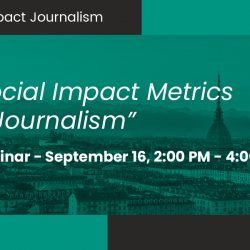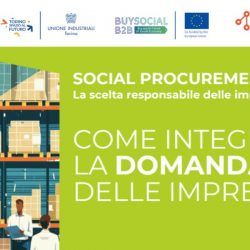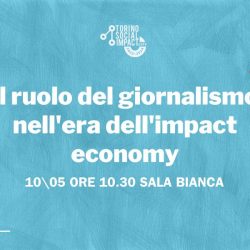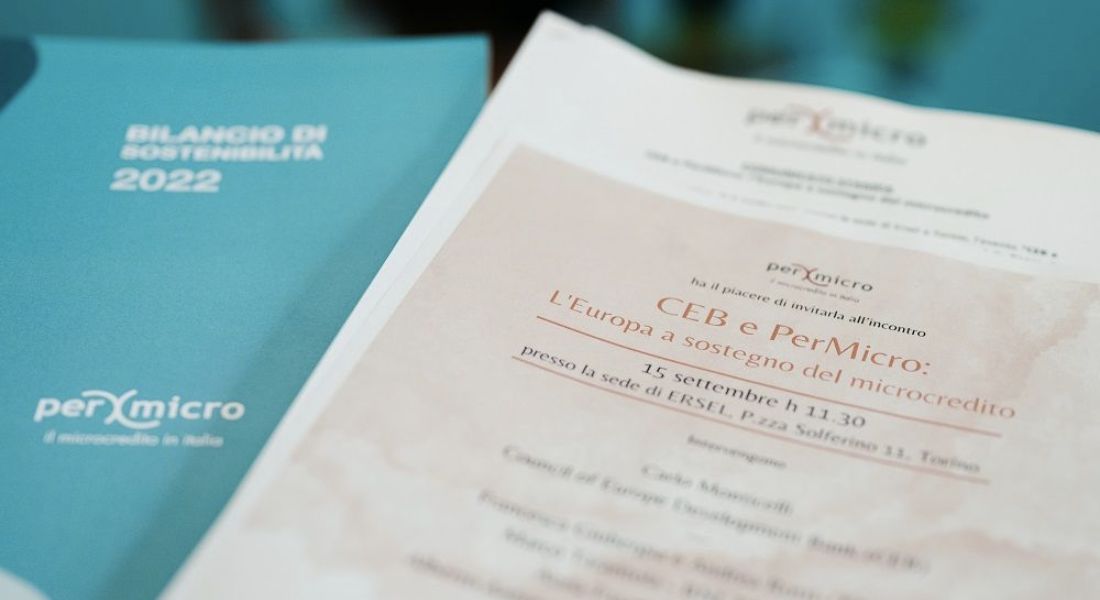Turin, Friday 15 September 2023.
The event “CEB and PerMicro: Europe in support of microcredit” took place today at Ersel’s headquarters in Turin, during which the Governor of the Council of Europe Development Bank (CEB), Carlo Monticelli, announced the granting of a 12 million euro credit line in favour of PerMicro.
The Programme
CEB provides loan programmes to microfinance institutions in Europe with the aim of promoting entrepreneurship and self-employment, supporting the creation and development of micro-enterprises, thereby contributing to income generation, job retention and creation, and the financial inclusion of vulnerable populations, rural communities, women, migrants and ethnic minorities, with the aim of addressing regional disparities, income inequalities and gender imbalances.
The loan from this programme will support PerMicro’s portfolio of loans to enterprises to finance their investment and working capital needs. The credit line granted by CEB will allow PerMicro to provide loans with the following characteristics:
- the final recipients are micro-enterprises, including start-ups, which employ fewer than 10 people and whose annual turnover or annual balance sheet total does not exceed EUR 2 million (EU definition of micro-enterprises);
- the loans will have a maturity of between 24 and 72 months and will not require collateral;
- at least 25 per cent must be granted to women’s enterprises;
- refinancing is not allowed;
- loans to traders or tobacco producers are not allowed;
- other sectors not allowed, in addition to those prohibited by PerMicro’s code of ethics (arms, pornography sector, betting): mining sector, waste treatment incinerators, sectors involving animal experiments, real estate, financial, nuclear, sectors harmful to health or the environment.
The scenario
Italy has the highest number of self-employed workers (2.2 million) in the EU and is identified as one of the EU countries with the highest number of entrepreneurs (0.6 million). Furthermore, the country has the second highest population of foreign residents in the EU (9% of the population). Italy also has significant gaps in terms of entrepreneurial activity and financial inclusion, especially for the most vulnerable groups.
Microfinance can have a positive impact on these challenges facing Italy by promoting entrepreneurial activity, self-employment and economic development. Italy has the highest estimated financial gap for microfinance in the EU, with an estimated unmet demand for microcredit of around EUR 2 billion per year, representing around 15% of the total financial gap in the EU.*
The provision of microloans enables financially excluded people, particularly those without collateral and without a credit history, to gain access to credit. This type of financing is often used as a means to encourage increased self-employment (often facilitating the transition from unemployment to self-employment) and to support the formation and growth of micro-enterprises, playing an important role in the implementation of EU policy objectives. PerMicro’s client base is made up of financially excluded clients who are granted a loan with the ultimate goal of accompanying them towards bankability.
The estimated social impact of the Programme will be considerable: by adding the gender dimension in lending to eligible enterprises, this impact will be based not only on the number of jobs that will be retained or created, facilitating access to finance and entrepreneurial activity for existing micro-enterprises or start-ups, but also on reducing gender inequality.
Social Impact of PerMicro
A research conducted by Centro Tiresia of the Politecnico di Milano analysed the social impact of 11 years of activity (2009-2019) of PerMicro:
- Unbanked people who became bankable: 6,335.
- Jobs created: 2,452.
- Increased government revenue (Irpef and tax revenue due to increased income and consumption): 111 million euros.
- Reduction in public expenditure (reduction in state subsidies and administrative costs): Euro 17 million.
- On average, each financed enterprise created 1.3 jobs.
Statements
PerMicro’s CEO, Benigno Imbriano, states: ‘The gap between the increasingly rich few and the increasingly poor many is something that, if not addressed, will irreparably condition our future, making life difficult even for those who think they are not part of these dynamics. A country with integrity, sound in its principles, should be able to work for its economic growth, but at the same time it should be able to work to reduce inequalities. Access to soft finance such as the CEB loan will be crucial for PerMicro to sustain its activities, allowing us to increase our business volumes and thus our social impact.”
Carlo Monticelli, Governor of the Council of Europe Development Bank, adds “Supporting microcredit is an integral part of the CEB’s social mandate and has now acquired strategic importance for the Bank. It is important to support institutions operating in this sector, such as PerMicro, so that their activities can support an increasing number of micro-entrepreneurs who wish to start a new business or expand an existing one, thus contributing to the promotion of financial and social inclusion in the country. Our 10-year cooperation with PerMicro and the social impact it has produced is a tangible example of how financial and European institutions can come together to address complex challenges by investing in people and communities.”
“We have always believed in the social importance of a project like PerMicro, which is why we have chosen to support it since 2007, first with Fondazione Paideia and now with our family holding company. – Commented Guido Giubergia, President of Narval – We see microcredit as a fundamental element for the development of the country, both in the social and productive spheres, to support therefore, on the one hand, families in difficulty and, on the other hand, to give a chance to those who have a valid business idea. PerMicro, in this sense, over the years has been able to provide a concrete contribution of which we are very proud.”
*Data source: OCSE (2021). The Missing Entrepreneurs 2021, p.41; Microfinanza nell’Unione Europea: Market analysis and recommendations for delivery options in 2021-2027 p.3. e p. 91.
Popular
 “Metrics of social impact in… 1 August 2024
“Metrics of social impact in… 1 August 2024  Turin is the 2024 European Capital of Innovation (iCapital) 14 November 2024
Turin is the 2024 European Capital of Innovation (iCapital) 14 November 2024  “Foundations and Principles of Solutions… 27 May 2024
“Foundations and Principles of Solutions… 27 May 2024  Webinar “Fundamentals and principles of… 17 May 2024
Webinar “Fundamentals and principles of… 17 May 2024  Social Procurement, the Responsible Choice for… 24 May 2024
Social Procurement, the Responsible Choice for… 24 May 2024  Salone del Libro 2024: Guests of the Event… 24 April 2024
Salone del Libro 2024: Guests of the Event… 24 April 2024 

